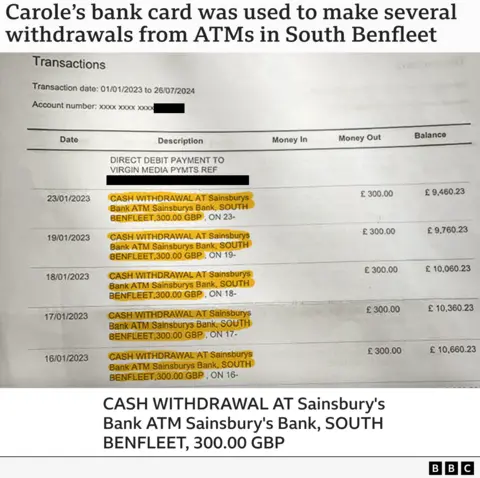by Sue Mitchell
Elderly and vulnerable people in south-east England have told the BBC how they lost control of their money and property after dealing with a law firm based in Essex.
They described how they were persuaded - and sometimes felt under pressure - to grant lasting power of attorney (LPA) to a man called Ron Hiller, a partner in the firm.
LPA is a legal agreement in which someone appoints an "attorney" to make decisions on their behalf, either for finance or health and welfare.
Attorneys are supposed to act in their clients' best interests. But we investigated 30 cases involving Mr Hiller and his firm, Craybeck Law, and found a disturbing pattern of events:
- People found they had no access to their bank accounts and no idea how much Mr Hiller was charging for being their attorney
- Large amounts of cash were withdrawn without a reasonable explanation
- Properties were sold for what owners and others considered was lower than market value, and possessions were cleared and disposed of without owners' knowledge or informed consent
There has been a massive rise in LPAs in England and Wales in recent years. In 2023, more than one million people registered - a rise of 37% on the year before.
I spoke to dozens of vulnerable people, as well as their friends, family and neighbours, who expressed concern about Ron Hiller's business practices.
My findings also raise concerns about the potential lack of oversight within the system, and whether the body that regulates attorneys - the Office of the Public Guardian (OPG) - is able to deal with such problems.
A spokesperson for Craybeck Law has denied any wrongdoing but said the firm could not respond to claims about specific individuals, because of client confidentiality.
We made repeated attempts to speak to Mr Hiller in person, including at his home, but he did not respond.
Carole's story
Carole was in her 60s, living alone in a house in Uxbridge, west London.
In April 2022 she was admitted to hospital with an infection. She never came back.
Her friends and neighbours, Bert and Hazel, wanted to visit her in hospital but Covid restrictions were in place. Then the hospital told them she had been transferred to a care home.
They rang the home repeatedly but were never put through. They left messages but their calls were not returned.
Within months, Carole's house had been completely cleared out and sold for £355,000 - a low price, the neighbours thought, considering other houses in the street were fetching up to half a million.
Hazel and Bert were worried about what was happening, but they had no legal right to know any more details.
They wrote asking for my help, as they knew I had investigated a similar case.
I managed to track down Sandie, Carole's cousin.
Together we paid a visit to Carole's care home in the Hertfordshire town of Rickmansworth.
Carole told us she was desperate to leave, but was stuck there. She said she had been introduced to Ron Hiller at the care home, and he had convinced her to grant him lasting power of attorney over her finances.
Most people appoint family members to be their attorney but for Carole, this had not been an option. Her closest relative was Sandie - however, she lived about a 100-mile drive away and suffered from serious health problems.
A property and finance LPA can be activated as soon as it is registered. Carole told us she had been in a lot of pain when she arrived at the care home, and her LPA shows she agreed to grant these powers to Mr Hiller straight away.
Since that point, she had been without her bank cards and had received no statements. She was also in the dark about how much she was paying Mr Hiller to manage her finances.
She had wanted to call Hazel and Bert, but Mr Hiller had given her a new phone that didn't contain any of her old contacts.
Carole told us he had advised her to sell her house in order to pay the care home fees, then later told her it had fetched a low price because nobody had wanted to buy in her area.
As we sat talking, Sandie looked at her phone and discovered the house was on the market again. This time, the asking price was almost £100,000 more than when Mr Hiller had sold it for Carole.
After meeting Carole in the care home, Sandie asked for detailed accounts from Craybeck Law.
What came was a slow drip-feed of bank statements, with no real explanation of Mr Hiller's charges and hardly any receipts.
However, they did show that large sums of money had been taken from Carole's account. Her bank card had been used to make a series of £300 cash withdrawals from ATMs in the Essex town of South Benfleet, near Mr Hiller's office.
He told Sandie that Carole had authorised the withdrawals - but later, when Carole asked to see invoices, they were not produced.

Full Article & Source:
Bank accounts locked and cash withdrawn after elderly gave power to law firm partner







No comments:
Post a Comment